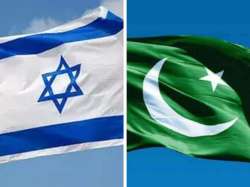Why are relations strained between Pakistan and Israel? | EXPLAINED
In a latest development, five Pakistanis were arrested for travelling to Israel, as the former country does not recognise the Jewish state, exemplifying the tense relations between the two nations.

The arrest of five Pakistanis by the country's Federal Investigation Agency (FIA) for travelling to Israel serves as yet another reminder of the strained ties between the two countries. As Pakistan does not recognise Israel as a state, naturally Pakistani citizens are barred from travelling to the Jewish country.
The five suspects arrested in Pakistan were said to be working in Israel's Tel Aviv for several years as 'helpers and car washers'. They have been charged with illegal emigration. The suspects allegedly came to Israel by traveling through different countries like Kenya, Turkey and Sri Lanka.
"By travelling to a country that was not recognised, the suspects had violated multiple laws," said FIA Sindh (Zone-II) Director Abdul Hameed Bhutto.
The suspects also sent money to their families as foreign remittances through the Western Union of Pakistan post office. A total of eight suspects have been reportedly identified by the FIA for 'illegally travelling' to Israel, three of whom were yet to be arrested.
Why are Pakistan and Israel at odds?As of 2023, Pakistan and Israel do not share any diplomatic relations, as Islamabad has repeatedly called for an independent state for Palestinians. Pakistan is one of the 30 countries, including Iran, Iraq, Saudi Arabia, Bangladesh, Bhutan, Kuwait, Lebanon and Indonesia that have refused to establish diplomatic ties with Israel.
The state of Israel was created in 1948 when the United Nations called for the territory of Palestine to be split into Jewish and Arab states. Both sides claim the land for the last couple thousands of years. When Israel was finally created, several Arab countries like Egypt, Jordan, Iraq and Syria joined forces against Israel in the 1948 Arab-Israeli war.
The war ended in Israeli victory, and caused thousands of Palestinians to flee their homes. Most of the territory was controlled by Israel. By 1967, Israel occupied East Jerusalem and the West Bank. The fundamental element of the Israel-Palestine conflict comes down to the city of Jerusalem. Israel claims Jerusalem as the capital of its Jewish, while Palestinian leaders claim it as the capital of a future Palestinian state.
The religious factor is quite visible in this conflict as both Zionists in Israel and Islamists in Palestine hold Jerusalem as central to their religion and culture. Jerusalem is considered one of the holiest sites for Islam. The sanctity of Jerusalem is similarly held by many Muslim nations, including Pakistan. Hence, Pakistan's opposition to the state of Israel stems from its support to Arab and Muslim countries.
Despite 75 years since the creation of Israel, its relations with Islamabad remain frayed and no official diplomatic visits have been recorded between the two countries.
Have Pakistani and Israeli leaders attempted to normalise ties?In April, current Pakistan Prime Minister Shehbaz Sharif ruled out any possibility of normalising diplomatic relations with Israel until the Palestinians get their 'legitimate right' of an independent candidate. However, it is not like the leaders of the two nations have not come close to the idea.
In 2005, former Pakistan Pervez Musharraf had reportedly initiated a meeting between then foreign minister Khurshid Kasuri and ex-Israeli foreign minister Silvan Shalom. This made Musharraf the first Pakistani head of state to meet an Israeli leader. The ex-Pakistan PM had seriously considered establishing trade and diplomatic ties with Israel.
Shalom had then reassured the Pakistani leadership that Israel never planned on taking out Islamabad's nuclear programme, nor it considered Pakistan as an enemy. These statements were reiterated by Israeli Prime Minister Benjamin Netanyahu in 2018, where he said that Pakistan should also not be an enemy of Israel.
In 2021, a senior adviser to former Pakistan PM Imran Khan, Sayed Zulfikar Bukhari, was alleged to have met Israeli officials and deliver messages from the country's leadership, although he later denied this claim. The next year, media reports said that a former government minister reportedly met Israeli foreign ministry officials, accompanied by a Pakistani delegation. This claim too was denied by the government.
What is the future of Pakistan-Israel ties?There has been a divided opinion on the prospect of Pakistan normalising relations with Israel. While maintaining trade and diplomatic ties can provide relief for the cash-strapped Pakistan in cases of debt or large-scale crises, the same can provide Israel with increased flow of trade and connectivity.
However, even as pressure mounts on Pakistan to normalise ties with Israel, as Turkey, Egypt, Jordan, the UAE, Bahrain and Morocco have done, repeated clashes between Israeli and Palestinian forces have stalled any such prospects. The recent West Bank operation in the Jenin refugee camp, which claimed the lives of 12 Palestinians, was met with fierce criticism by Pakistan.
Thousands of people from both sides have been killed in the Israeli-Palestine conflict. The issue of Palestinian demand for an independent state remains at the core ideology of Pakistan's stance on the conflict. The Abraham Accords may cause Pakistan to indirectly enter a partnership with Israel as the former is economically dependent on the signatory countries, as well as the United States.
However, the opposition Israel faces from more than 30 countries, mostly Muslim nations, might stall any efforts to establish official relations. Furthermore, the growing relations between India, the United States and Israel has instilled hesitance within Islamabad to change its policy towards the latter. Especially after India and the US called out Pakistan to condemn cross-border terrorism on its territory.